A canvas of thoughts and creativity, where every entry is a brushstroke of insight, emotion, and imagination.
Don't wanna be here? Send us removal request.
Text
TikTok to Offer Direct Android App Downloads in the U.S. Amid Restrictions
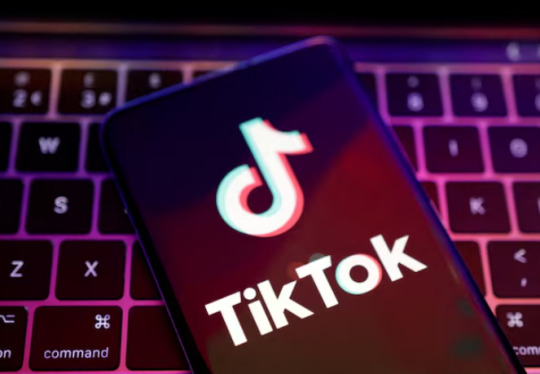
On Friday, TikTok announced it will allow U.S. Android users to download the app directly via package kits from its website, bypassing restrictions on the platform in the country. This move comes as Apple and Google have yet to reinstate TikTok to their app stores since a U.S. law took effect on January 19. The law requires TikTok's Chinese parent company, ByteDance, to either sell the app or face a potential ban on national security grounds.
Former President Donald Trump, who signed an executive order seeking a 75-day delay in enforcement, had been in talks about a potential sale of TikTok. The company boasts around 170 million American users. Trump also signed an executive order on Monday that included plans for the creation of a sovereign wealth fund, which could play a role in purchasing TikTok.
U.S. officials have raised concerns over the potential misuse of American user data under ByteDance's ownership. However, TikTok has disputed claims about its connections to China, asserting that its content recommendation algorithms and user data are stored on U.S. cloud servers operated by Oracle, and that content moderation for American users is handled in the U.S.
Despite concerns, free speech advocates have opposed the ban, which was passed by Congress and signed into law by President Joe Biden.
0 notes
Text
Founders Fund in Talks to Lead $2.5B Funding Round for Anduril
AI-powered defense technology startup Anduril Industries is in negotiations for a new funding round that could push its valuation to $28 billion, sources revealed on Friday. The round, expected to raise up to $2.5 billion, would be led by Peter Thiel's Founders Fund, signaling continued investor interest in the rapidly expanding defense tech sector. This funding comes just months after Anduril raised $1.5 billion at a $14 billion valuation in August.
Founders Fund has been a key investor in Anduril since its inception in 2017, and one of its co-founders, Trae Stephens, is also a partner at the firm. While Founders Fund declined to comment, the news was first reported by CNBC.

Anduril, based in Costa Mesa, California, specializes in developing autonomous defense systems, including drones and a variety of sensors. The company recently announced plans to build a large-scale weapons manufacturing plant in central Ohio, using the new funding to enhance its production capabilities.
In 2023, Anduril unveiled its Lattice for Mission Autonomy, an AI-driven software system designed to enable autonomous units to collaborate during missions under human oversight.
Before founding Anduril, Palmer Luckey, who started the company, gained recognition for founding Oculus VR, which Facebook acquired in 2014 for $2.3 billion. Anduril also has connections in the political sphere, with U.S. Vice President JD Vance having invested in the company before his political career.
Thiel, a co-founder of military tech company Palantir, has been a prominent Republican donor, supporting Donald Trump's 2016 campaign and Vance’s 2022 Senate run.
0 notes
Text
Fed Officials Emphasize Caution on Rate Cuts Amid Solid Job Market
Federal Reserve officials have expressed confidence in the strength of the U.S. job market but signaled they are not in a rush to cut interest rates. Speaking on Friday, Federal Reserve Governor Adriana Kugler pointed to a 4% unemployment rate and the addition of 143,000 jobs in December as evidence of a stable labor market. She noted that this data reflected a healthy economy that is neither weakening nor showing signs of overheating.

However, Kugler emphasized the uncertainty surrounding the economic impact of President Donald Trump’s policies and the slow and uneven progress on inflation, which remains elevated. The Fed's preferred inflation measure, the 12-month change in the personal consumption expenditures (PCE) price index, was at 2.6% in December, above the Fed’s target of 2%.
Given these factors, Kugler suggested it would be prudent to maintain the federal funds rate at its current level for the time being. Consumer expectations for inflation also spiked, with a University of Michigan survey showing a one-percentage-point rise to 4.3%, the highest since November 2023.
Following the release of the data, stock prices fell, and traders speculated that the Fed would only cut rates once in 2024, likely waiting until the second half of the year.
Federal Reserve Chair Jerome Powell echoed this cautious stance last week, stating there was no need for urgency in rate cuts. He cited the persistent inflation challenges, the robust labor market, and the ongoing uncertainty around the impact of Trump’s policies as reasons for holding steady on rates.
Trump’s tariff plans, which included a 25% tax on imports from Mexico and Canada, added to the policy uncertainty. While these plans were temporarily put on hold, the imposition of 10% tariffs on Chinese goods continued. The Fed is carefully monitoring these developments, as tariffs typically raise prices in the short term but do not alter long-term inflation trends.
Minneapolis Fed President Neel Kashkari also emphasized a "wait and see" approach, stressing the need for more information on tariffs, taxes, and immigration policies before making any decisions on rate changes. He added that the next two months of inflation data would be crucial in shaping future policy.
Meanwhile, Chicago Fed President Austan Goolsbee expressed optimism that inflation would return to the 2% target, which would allow for future rate cuts. However, not all Fed officials share this view. Dallas Fed President Lorie Logan, speaking on Thursday, indicated she would prefer to keep rates steady even if inflation nears the 2% target, unless the labor market shows signs of weakness.
As the Fed navigates these uncertainties, the outlook for interest rates remains cautious, with policymakers committed to waiting for clearer economic signals before taking further action.
0 notes
Text
Trump Revokes Biden's Security Clearance, Citing Trust Issues
Former U.S. President Donald Trump announced he is revoking President Joe Biden's security clearance and access to daily intelligence briefings, continuing a pattern of taking action against his political opponents. In a post on his Truth Social platform, Trump wrote, "There is no need for Joe Biden to continue receiving access to classified information." He added, "JOE, YOU'RE FIRED," referencing his well-known catchphrase from The Apprentice.
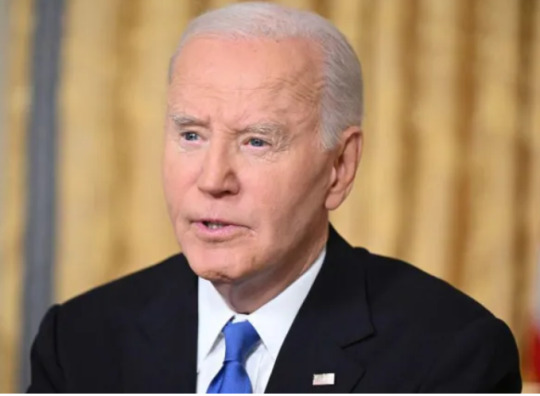
Trump has previously revoked the security clearances of over 50 former intelligence officials whom he accused of interfering in the 2020 election in favor of Biden. On Friday, he claimed that Biden had "set this precedent" by restricting his own access to classified intelligence in 2021, calling it a move he justified by questioning Trump's trustworthiness. He also cited an investigation into Biden’s handling of classified files, pointing to Biden’s occasional memory lapses. While the inquiry did not lead to criminal charges, it noted that Biden had trouble recalling key life events.
Biden did not immediately respond to Trump’s decision, and his representative did not comment on the matter. The move to revoke Biden's clearance comes after Biden took the unprecedented step of denying Trump access to intelligence briefings during his term as the former president, citing Trump’s "erratic behavior" and the risk of him mishandling sensitive information.
In a related move, Trump has also revoked the security clearances and protections of several other Biden-era officials, including former U.S. military chief Mark Milley, who has been critical of Trump. Trump further ordered the review of Milley's military grade and the investigation into his conduct. Additionally, Trump terminated the security details of former top health advisor Anthony Fauci and former Secretary of State Mike Pompeo, saying it was "very standard" to end security protection for former officials.
The move to rescind clearances for former intelligence officials continues, particularly those who signed a 2020 letter suggesting that reports about Hunter Biden's laptop were part of a Russian disinformation campaign. The laptop's contents, which included evidence of drug use and foreign business dealings, were later confirmed to be genuine.
Trump’s latest actions are part of his broader effort to reshape U.S. government policies, particularly in regard to his political opponents and former officials from the Biden administration.
0 notes
Text
Judge Blocks Trump’s Plan to Place Thousands of USAID Workers on Leave
A federal judge has temporarily halted President Donald Trump's plan to place over 2,200 employees at the U.S. Agency for International Development (USAID) on paid leave, just hours before the action was set to take place. Judge Carl Nichols issued a "limited" temporary restraining order following an emergency lawsuit filed by two unions representing USAID workers.
The order, which prevents the implementation of the leave plan, will remain in effect until February 14 at midnight. The judge’s ruling also reinstates 500 USAID staff members who had already been placed on administrative leave.
Trump’s administration had proposed placing nearly all of USAID’s 10,000 employees on leave as part of a broader effort to reduce federal spending, with the exception of 611 employees. The move was part of his administration’s drive to cut costs and dismantle what he has described as an inefficient government agency. However, the unions argued that the plan would harm workers and violate constitutional protections.

Judge Nichols sided with the unions, stating that they would suffer "irreparable harm" if the decision was allowed to proceed. He emphasized that the government would not face significant harm from the delay. As a result of the ruling, all USAID employees placed on administrative leave are to be reinstated and granted full access to email, payment, and security systems.
The decision came as USAID staff were seen removing agency signage from their Washington, D.C., headquarters, and the agency’s website was temporarily unavailable, only showing a page regarding the personnel cuts.
USAID is the world’s largest provider of international aid, with a significant portion of its budget directed toward global health initiatives. The agency’s operations span across many of the world’s poorest regions, and it employs thousands of staff both domestically and internationally. Trump’s administration has sought to cut funding and reduce the agency's reach, drawing significant criticism from both domestic and international stakeholders.
In addition to the USAID case, a separate legal battle involving Elon Musk’s Department of Government Efficiency (Doge) also unfolded over the weekend. A federal judge ruled against Musk’s access to sensitive financial records from the U.S. Treasury Department, citing violations of federal law. The ruling blocks Doge from reviewing millions of Americans’ personal financial data, a case that will also be addressed in a hearing scheduled for February 14.
USAID’s future remains uncertain as the administration continues its efforts to cut federal spending, with many critics warning that dismantling the agency would have dire consequences on global health and humanitarian programs.
0 notes
Text
Mysterious Tremors Linked to Massive Nine-Day Tsunami
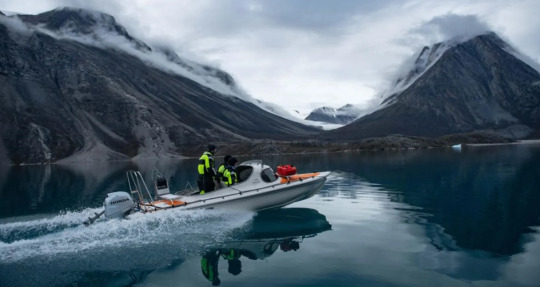
A colossal landslide in Greenland’s Dickson Fjord has been identified as the source of mysterious tremors that reverberated around the globe for nine days last September. This seismic anomaly, initially perplexing scientists, was ultimately traced back to a massive wave triggered by the collapse of a mountainside.
The Tsunami Event
The landslide involved a vast amount of rock, estimated at 25 million cubic meters—equivalent to the volume of 25 Empire State Buildings—collapsing into the fjord and creating a towering 200-meter high wave. This wave became trapped within the narrow fjord, causing it to oscillate back and forth, generating persistent seismic vibrations detectable worldwide.
Scientific Investigation
The discovery was the result of an international collaboration, including scientists from UCL and the Danish Navy. Dr. Stephen Hicks from UCL described the initial seismic signal as an “unidentified seismic object,” different from typical earthquake patterns. The signal persisted every 90 seconds for the entire nine-day period.
By analyzing seismic data and comparing satellite imagery and photographs taken before and after the event, researchers pinpointed the landslide's origin in Dickson Fjord. Images revealed a massive dust cloud and significant changes in the glacier’s surface, confirming the landslide's impact.
Climate Change Connection
The research, published in Science, links the landslide to climate change. Rising temperatures in Greenland have weakened the glaciers supporting the mountains, contributing to increased frequency of such landslides. Dr. Hicks noted, “The glacier was supporting this mountain, and as it thinned, it stopped holding it up.” The ongoing climate crisis appears to be amplifying the risk of these dramatic events.
Implications and Future Research
While the event occurred in a remote area of Greenland, it highlights a growing concern for Arctic regions where similar occurrences might become more frequent. Dr. Kristian Svennevig from the National Geological Surveys for Denmark and Greenland (GEUS) emphasized the need for further research to understand and mitigate the impacts of such phenomena.
Dr. Hicks also remarked that this event may represent “the first time a climate change event has impacted the crust beneath our feet all the world over,” underscoring the broader implications of climate-induced geological changes.
0 notes
Text
England's Jacob Bethell Makes Impactful Debut Against Australia

In a significant moment for English cricket, 20-year-old Jacob Bethell debuted for England in a T20 match against Australia in Southampton. Despite a challenging start—returning figures of 0-28 from three overs and a tough six-ball innings—Bethell’s arrival marks an exciting new chapter for the team.
Bethell, a rising star who has already caught the eye of coach Marcus Trescothick, was still in school during England's 2019 World Cup triumph. His selection as one of five uncapped players in the squad highlights his rapid ascent from Barbados to the international stage.
From his early cricketing days in Barbados, where he impressed Brian Lara at age 12, to receiving mentorship from West Indies legend Sir Garfield Sobers, Bethell’s journey has been nothing short of remarkable. His debut was a family affair, with relatives traveling from the Caribbean to witness the milestone.
Known for his aggressive batting and traditional techniques, Bethell aims to excel in all formats of the game. As he embarks on his international career, his focus remains on making a significant impact and navigating the competitive landscape of cricket.
0 notes
Text
Denmark Returns Sacred Indigenous Cloak to Brazil
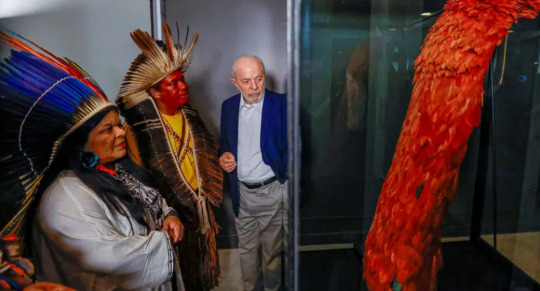
In a historic ceremony held in Rio de Janeiro, Brazil celebrated the return of a sacred indigenous cloak that had been housed at a Danish museum for over 300 years. The 1.8-meter-long cloak, crafted from 4,000 red feathers of the scarlet ibis bird, was officially unveiled in the presence of President Luiz Inácio Lula da Silva.
The cloak, which was taken from the Tupinambá people during the Portuguese colonial era, had been on display in Copenhagen since 1689. The return of this artifact underscores the ongoing importance of recognizing and preserving indigenous heritage and ancestral lands.
A significant gathering of 200 Tupinambá people, who camped outside the ceremony venue with drums and pipes filled with medicinal herbs, awaited the unveiling. Among them was Yakuy Tupinambá, who traveled over 1,200 kilometers from Olivenca to witness the event. “I felt sadness and joy. A mixture between being born and dying,” he shared with AFP.
Indigenous chief Sussu Arana Morubyxada Tupinambá expressed the deep cultural impact of the cloak’s return, stating, “Our ancestors say that when they [the Europeans] took it away, our village was left without a north.”
While the returned cloak marks a significant moment, several other sacred Tupinambá capes, believed to date back to the 16th century, remain in European museums. Tupinambá leaders view the return of the cloak not just as a restitution of cultural artifacts but as a vital step toward recognizing indigenous rights and territories.
President Lula, who has previously voiced support for indigenous land rights, reiterated his stance against limitations on land claims. Despite his veto of a controversial bill restricting indigenous land claims, the National Congress overruled his decision, and the matter is now under review by the Federal Supreme Court. Lula affirmed his commitment to the constitutional rights of indigenous peoples to their land and culture.
The Tupinambá community continues to face challenges as their mineral-rich territory is threatened by large-scale agriculture and mining activities. The return of the cloak symbolizes a broader movement towards acknowledging and safeguarding indigenous heritage and rights.
1 note
·
View note
Text
World Nomad Games: A Grand Showcase of Central Asian Traditions

The fifth edition of the World Nomad Games has begun in Astana, Kazakhstan, celebrating the rich cultural heritage and traditional sports of Central Asia. Known as the "Great Gathering on the Steppe," this event brings together diverse communities from across inner Asia to showcase a unique blend of ancient sports, cultural practices, and traditional artistry.
Often likened to a fusion of the Highland Games and the Mongolian Naadam festival, the World Nomad Games offer a glimpse into what the Olympics might have looked like under Genghis Khan’s reign. The games feature a variety of traditional sports, including horseback wrestling and strongman competitions, alongside a vibrant display of Kazakh food, attire, and epic storytelling. The event aims to preserve and promote the nomadic culture that faces threats from modernization, globalization, and climate change.
Held every two years in different locations, the World Nomad Games' next edition in 2026 is expected to return to Kyrgyzstan, the site of the inaugural event in 2014. This year's festivities will conclude on September 13.
A Stunning Opening Ceremony The opening ceremony on September 8 was a dazzling spectacle, with 3,000 athletes from 89 countries parading before an audience of Central Asia’s political elite. The performance traced the history of the Kazakh steppe from ancient Scythian warriors to the rise of the Golden Horde and the Kazakh khanate. The arena was transformed into a symbolic yurt, echoing the traditional gatherings of nomadic confederations.
The Thrill of Kokpar One of the most exhilarating events is kokpar (also known as kok buru, ulak tartysh, or buzkashi), a sport akin to rugby on horseback but with a headless goat carcass as the ball. The game is fiercely competitive, often resulting in injuries as players vie to secure the carcass and score by placing it in a ring. The Kazakh team emerged victorious against Kyrgyzstan in a dramatic final, watched by thousands.
Preserving Traditional Eagle Hunting Hunting with eagles is another highlight, though it’s one of the most endangered sports featured. Skilled eagle hunters (berkutchi) from Kyrgyzstan, Kazakhstan, and Mongolia showcase their ability to train golden eagles for hunting foxes, rabbits, and wolves. This ancient practice is deeply rooted in the region's culture and requires years of training.
Horseback Wrestling and More Horseback wrestling (audaryspak) is a central sport, taking place in a 15-meter arena with bouts divided into weight categories. The objective is to unseat the opponent from their horse or push them out of the circle. Other wrestling styles include Kazakh, Turkish, Tatar, and Kyrgyz variations, many of which feature female competitors.
Archery, both on foot and horseback, remains a poignant reminder of Central Asia's warrior heritage, while mas-wrestling, a form of stick tug-of-war from Yakutiya, offers a unique and engaging competition.
Celebrating Nomadic Culture The World Nomad Games go beyond sports to celebrate nomadic culture. The Ethno-aul, a village of yurts, craft shops, and eateries, hosts reenactments and performances of traditional music and folklore. Noteworthy among these are the akim, bards who perform epic poetry accompanied by the dombra, a traditional Kazakh lute.
Preserving Artistry The Games also emphasize traditional crafts. Master artisans, like Bulbul Kapkyzy, showcase skills in weaving, yurt-making, and other traditional crafts. Kapkyzy, a Kazakh from Mongolia, has dedicated over 45 years to preserving these arts.
Astana’s Modern Backdrop Astana's futuristic architecture contrasts with the ancient traditions celebrated at the Games. Known for its cutting-edge design by architects like Norman Foster, the city stands as a modern marvel on the steppe, even though it is one of the coldest capitals in the world.
The World Nomad Games not only highlight the rich heritage of Central Asia but also bring together a global audience to appreciate and celebrate a vibrant, living tradition.
0 notes
Text
“The Trial of the Century in Sports Begins: Premier League vs. Manchester City Over 115 Charges”

After years of anticipation, English football is set to witness its most high-profile legal showdown as the Premier League takes on reigning champions Manchester City in a case fraught with controversy and potential seismic shifts.
Manchester City faces a staggering 115 charges for allegedly breaching financial regulations in a case that could redefine the boundaries of the sport. The proceedings are set to commence on Monday at an undisclosed location, subject to any last-minute legal delays. Dubbed as sport’s "trial of the century," the case is expected to unfold over the next ten weeks, with a verdict anticipated in early 2025.
This trial represents a pivotal moment in a legal saga that has never before been seen in football. The charges come against the backdrop of Manchester City’s unprecedented dominance, having clinched the Premier League title for four consecutive seasons. The case involves allegations of financial misconduct spanning 14 seasons, including accusations of falsifying financial information.
The implications of the trial are profound. Should Manchester City be found guilty of the most severe charges, they could face penalties ranging from a significant points deduction to relegation or even expulsion from the Premier League. Such outcomes would not only tarnish City’s recent achievements but also create uncertainty around the future of the team, its manager, and its players. Additionally, it could lead to compensation claims from other clubs and potentially strain diplomatic relations between the UK and the UAE, given the ownership ties.
On the other hand, if Manchester City is exonerated, it could cast doubt on the effectiveness of the Premier League's regulations designed to ensure financial fairness and competitive balance.
The case comes at a time of increased scrutiny for the Premier League, which has faced various challenges. Last month, Premier League Chief Executive Richard Masters emphasized the urgency of resolving the case, stating, "It is time now" for the matter to be addressed.
The origins of the case trace back to 2018 when leaked documents published by Der Spiegel suggested that Manchester City had engaged in financial manipulation to circumvent UEFA’s financial fair play (FFP) rules. The allegations included inflating sponsorship revenues from state-owned entities and making secret payments to bypass financial regulations.
Despite City’s vehement denials and claims that the leaked documents were obtained illegally, both UEFA and the Premier League initiated investigations. City was previously fined by UEFA and faced a two-year ban from European competitions in early 2020, which was later overturned on appeal.
The Premier League’s investigation, ongoing since 2018, has now culminated in these serious charges. The proceedings will scrutinize whether City’s financial practices were as irregular as alleged and whether they violated the league’s rules.
As the case unfolds, it will not only shape the future of Manchester City but also impact the integrity of financial regulations in football. The trial is poised to be a landmark moment in sports history, with consequences that could reverberate far beyond the football pitch.
0 notes
Text
Microsoft Cuts 650 Gaming Jobs Amid Continued Restructuring

Microsoft is set to eliminate around 650 positions from its gaming division, marking the latest in a series of workforce reductions following its $69 billion acquisition of Activision Blizzard. The cuts, which will affect roles primarily in corporate and support functions globally, come after the company previously laid off 1,900 employees in January and shuttered four studios in May.
In an internal memo shared online and confirmed by the BBC, Phil Spencer, head of Xbox, assured employees that "no games, devices, or experiences are being canceled, and no studios are being closed" as a result of this latest round of layoffs. Spencer emphasized that the job reductions are part of an effort to "align our post-acquisition team structure" and set the company up for "long-term success."
The recent job cuts represent about 3% of Microsoft’s gaming workforce. Spencer noted that while the restructuring will not impact game development or studio operations directly, there could be "some impacts to other teams" as they adjust to new priorities and manage game lifecycles.
This move comes against the backdrop of widespread layoffs in the gaming industry over the past two years. Major companies like Sony, Riot Games, and Epic Games have also reduced their staff amidst a surge of investments and acquisitions fueled by pandemic-era growth.
Microsoft's gaming sector has faced scrutiny for previous studio closures, including those of Arkane Austin and Tango Gameworks earlier this year. Despite this, the company reported increased gaming revenues in its latest financial update, largely due to its ownership of Activision Blizzard, known for titles like World of Warcraft, Diablo, and Overwatch. However, Xbox hardware sales have declined since last year, prompting Microsoft to focus on expanding software sales.
At recent gaming events, Microsoft showcased upcoming titles such as Call of Duty: Black Ops 6, which received positive feedback. Yet, the company has also faced criticism for raising prices on its Game Pass service and for decisions to release certain games on competing consoles. Notably, Indiana Jones and the Great Circle will be available on PlayStation 5, though it will launch on Sony's console months after its Xbox debut.
Microsoft has been contacted for additional comments regarding the latest layoffs.
0 notes
Text
New Beanless Coffee Emerges: Can It Compete with the Real Thing?

In the heart of San Francisco, a high-end coffee shop is serving a revolutionary new brew: coffee made without a single coffee bean. This innovation comes from Atomo, a Seattle-based startup leading the charge in the burgeoning field of beanless coffee.
Andy Kleitsch, CEO of Atomo, is clear that their product isn’t just a coffee substitute. “We take great offense when someone says that we’re a coffee substitute,” he asserts. Unlike traditional coffee alternatives, which often lack the authentic taste and caffeine kick of real coffee, Atomo aims to replicate the complete coffee experience from flavor to caffeine content.
The environmental impact of coffee cultivation is a significant concern, with coffee farming being the sixth-largest driver of deforestation globally. The rise in coffee consumption, especially in traditionally tea-drinking countries like India and China, and the shifting of plantations to higher altitudes due to climate change, exacerbate this issue. Beanless coffee proponents argue that their products offer a more eco-friendly alternative, potentially reducing the environmental footprint of coffee production. Additionally, with coffee prices hitting record highs and new EU regulations targeting deforestation-linked products, beanless coffee could become a more cost-effective choice.
Chahan Yeretzian, a professor at the Coffee Excellence Centre in Zurich, acknowledges the innovation in tackling deforestation but remains skeptical about the overall impact of beanless coffee. He notes that while such alternatives are promising, coffee farming provides essential livelihoods for many smallholder farmers, who might turn to equally problematic crops if coffee cultivation declines.
Atomo, founded in 2019, is already available in over 70 US coffee shops and has recently introduced a blend of beanless and conventional coffee for home brewing. Despite its higher price compared to premium traditional coffee, the company is gaining traction. The beanless brew uses a blend of date seeds, ramón seeds, sunflower seed extract, and other ingredients, with caffeine sourced from green tea and synthetic options.
Northern Wonder, a Dutch startup founded in 2021, is also making strides with its beanless coffee, featuring ingredients like lupin, chickpea, and malted barley. The company is still refining its formula and exploring new natural flavorings. Other players in the market include Singapore-based Prefer and San Francisco's Minus. Additionally, the concept of lab-grown coffee is being explored, with Finnish researchers and companies like Foodbrewer, California Cultured, and Another working on cell-based coffee, though regulatory hurdles and scalability concerns remain.
While beanless coffee has yet to fully replicate the aromatic experience of traditional coffee or the emotional connection many have with their brew, it’s sparking important conversations about sustainability and the future of coffee. For now, it seems unlikely that many will abandon traditional coffee entirely, but the rise of beanless options invites consumers to reconsider the sustainability and ethics of their coffee choices.
0 notes
Text
Historic Private Spacewalk Marks Milestone in Space Travel

In a groundbreaking achievement, a billionaire and an engineer have completed the first-ever spacewalk by a non-professional crew, marking a significant milestone for private space exploration. Jared Isaacman and Sarah Gillis successfully performed the spacewalk during the only commercial mission to execute this high-risk maneuver.
Isaacman and Gillis, donning specially-designed suits, exited the SpaceX spacecraft at approximately 11:52 BST, stepping into the vastness of space about 15 minutes apart. "Back at home we all have a lot of work to do, but from here, Earth sure looks like a perfect world," Isaacman commented as he floated outside the craft.
Prior to this event, only astronauts from government-funded space agencies had conducted spacewalks. The live broadcast showcased the duo emerging from the white Dragon capsule, floating 435 miles (700 km) above Earth’s surface. Isaacman was the first to exit, testing his suit's functionality before re-entering the spacecraft, followed by Gillis, a SpaceX engineer, who also completed her spacewalk outside the capsule.
The spacewalk, initially scheduled for 07:23 BST, faced a delay due to the crew’s meticulous preparations. The Dragon capsule, which lacks an airlock, required careful handling to transition from the spacecraft’s internal pressure to the vacuum of space. The crew spent two days “pre-breathing” to avoid decompression sickness, replacing nitrogen in their blood with oxygen before the craft was depressurized.
Dr. Simeon Barber, a research scientist at the Open University, highlighted the unique nature of this spacewalk compared to traditional ones from the International Space Station. “It’s really exciting and I think it shows again that SpaceX is not afraid to do things in a different way,” he told BBC News.
This mission involved considerable risks. Isaacman, who funded the Polaris Dawn mission, was the only crew member with prior space experience. Alongside him were close friend Scott 'Kidd' Poteet, a retired air force pilot, and SpaceX engineers Anna Menon and Sarah Gillis. The Dragon capsule, having previously flown 46 times and carried 50 crew members, was used in a new context with unregulated and untested spacesuits.
The spacewalk took place at an unprecedented altitude and utilized innovative extravehicular activity (EVA) suits, which feature a heads-up display for real-time information. Gillis read data from her helmet's display during her time outside the capsule. The EVA suits are designed for both launch and landing, negating the need for separate intravehicular activity (IVA) suits and adding extra flexibility.
The mission, launched on Tuesday, is set to reach up to 870 miles (1,400 km) in orbit, surpassing the altitude of any human spaceflight since the end of NASA's Apollo program in the 1970s.
This achievement underscores the potential for private companies to advance space travel and reduce costs, a goal shared by government agencies like NASA and entrepreneurs such as Isaacman and Elon Musk. While this milestone is symbolic of the future of space exploration, the high costs of such missions mean that widespread private space travel remains a distant prospect.
0 notes
Text
Trump's Message of American Decline Strikes a Chord with Key Voters

While Kamala Harris made an impact during the debate, former President Donald Trump's message of rescuing a declining America resonates strongly with undecided voters in crucial battleground regions like Saginaw, Michigan.
Decades ago, Paul Simon sang of a cross-country hitchhike from Saginaw, capturing the melancholy of a nation in transition. Even then, Saginaw was on a downward slope as Michigan's car factories began to shutter under foreign competition. Today, the desolation described in Simon and Garfunkel's ballads has only deepened.
On a quiet street in Saginaw, 57-year-old Rachel Oviedo sat on her porch, gazing at abandoned furniture and a defunct car parts plant that once served Chevrolet and Buick, which finally closed in 2014. "We sit here all day long," she shared, adding that the derelict factory has become a shelter for the homeless. "They need to tear it down and make something out of it—a grocery store, maybe, because we ain't got no grocery stores around here."
Undecided voters like Rachel, who represent the swing vote in Michigan's critical Saginaw County, are pivotal for the upcoming election. Rachel sees Trump as a "known quantity" and a "man of his word," whereas Harris, although likable, remains somewhat of an unknown. "I like her," she noted, "but we don’t know what she’s going to do."
Saginaw’s vote has the potential to swing either way, much like the state of Michigan, which has transitioned from being reliably Democratic to a true battleground. Chuck Brenner, a 49-year-old retired Saginaw police officer who still works part-time and runs a real estate business, has witnessed the city’s struggles firsthand. "Almost everybody’s dad worked in the car industry," he recalled. "Back then, everyone had money, and jobs were plentiful. Now people are struggling; they grow up poor, and then come the drugs and all that."
For voters like Chuck, Trump's narrative of American decline feels tangible. "Absolutely," he said. "Because you can see it." Though he voted for Trump in 2016, Chuck switched to Joe Biden in 2020 due to "a lot of drama" surrounding Trump and his legal troubles. This time, he's waiting for the debates to help him decide.
Saginaw, once a Democratic stronghold, has been a bellwether for the broader state’s shift. It supported Democrats for decades—from Bill Clinton to Joe Biden—until 2016, when it backed Trump. This change marked a significant political realignment in the region.
Jeremy Zehnder, who runs a truck-polishing business, represents another demographic that Democrats once counted on for support. Surrounded by the gleaming trucks that are the lifeblood of America’s economy, Jeremy explained that his voting decision would come down to economic issues, not debate performances. "With the truckers, every one of those that we know of are leaning towards the right," he said. When pressed further, he added, "I don’t know of one that isn’t. We do hundreds of trucks every year, and they all want to talk about it."
At a United Auto Workers (UAW) Union debate-watching event, Kamala Harris received applause and cheers, but there were clear signs of shifting allegiances even there. Joe Losier, a union organizer, admitted that many in his family, second-generation immigrants and lifelong UAW members, had moved towards the Republican Party. "It blows my mind that a lot of my family are tradesmen who are supporting Donald Trump," he said. He’s unsure which way his two adult sons will vote. "Dinner times are horrible," he joked.
With ongoing concerns about job cuts, many UAW members find themselves more aligned with Trump's hardline stance on tariffs, even as Harris argued such policies would raise prices. Following the debate, Chuck Brenner offered some hope to Democrats, stating, "I do believe Kamala was the shining star, and she’s won my vote. I was impressed by what she had to say."
However, Rachel Oviedo remained undecided but leaned more toward Trump. "I think he’ll do more for us up here," she said, acknowledging his flaws but emphasizing the need to "forgive people." Meanwhile, Jeremy Zehnder, while slightly surprised by Harris’s performance, remained committed to Trump, citing taxes, border policy, and cost of living as key factors.
The stark divisions are evident in Saginaw, where grassroots canvassers like Kathleen Skelcy find it challenging to understand the motivations of Trump supporters. "It’s scary, trying to understand these people and their thinking," she remarked, attributing it to a lack of education. As she spoke, a nearby Trump supporter shouted aggressively, "Harris is a clown," adding profanity to his tirade. Another Democratic supporter declined a yard sign for fear of similar backlash.
In just a few weeks, Saginaw will head to the polls, and the outcome here could be crucial. Journalists are likely to continue visiting this key district, searching for a pulse on America’s political climate.
Amid all the division and debate, finding middle ground seems more elusive than ever in Saginaw. As voters grapple with their decisions, the future of America hangs in the balance in this quintessential battleground.
0 notes
Text
Netanyahu Defies Ceasefire Calls Amid Protests and US Pressure
Israeli Prime Minister Benjamin Netanyahu resisted mounting calls for a ceasefire in Gaza on Monday, despite massive protests across Israel and growing pressure from U.S. President Joe Biden.
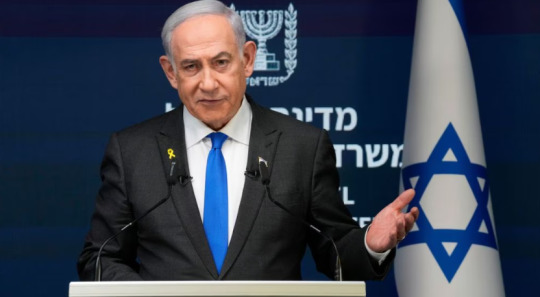
The push for a ceasefire follows nearly 11 months of conflict and the recent revelation of six more deceased hostages. In his first public address since the protests erupted, Netanyahu remained steadfast in his decision to maintain Israeli control over the Philadelphi corridor, a key area along Gaza's border with Egypt, which Israel alleges is used by Hamas to smuggle weapons. Both Egypt and Hamas deny these claims.
Netanyahu defended his stance, calling the corridor essential to preventing Hamas from rearming and emphasizing his dedication to freeing the hostages. "No one is more committed to freeing the hostages than I am," he declared. "No one will preach to me on this issue."
The Israeli leader faced intense criticism from the public, with thousands demonstrating on Sunday night—the largest protest since the conflict began. Many protesters, outraged by the hostage deaths, blamed Netanyahu for failing to secure a deal with Hamas that could have spared lives. A nationwide general strike took place on Monday in response to the unrest.
Demonstrators gathered outside Netanyahu’s residence in Jerusalem, brandishing coffins draped in the Israeli flag. Clashes with police resulted in several arrests, and protests also spread to Netanyahu’s Likud party headquarters in Tel Aviv.
Despite the public outcry, some Israelis continue to support Netanyahu's approach, believing that ongoing military action is necessary to compel Hamas to meet Israeli demands.
In the U.S., President Biden expressed frustration with Netanyahu’s handling of the situation, noting that while negotiations were nearing a deal, a faster resolution was needed.
Tensions escalated further when Hamas’ armed wing announced new directives on handling hostages since June, following the discovery of six hostages' bodies in a Gaza tunnel. Hamas claimed the hostages were executed as Israeli forces closed in, a charge Netanyahu vehemently denied. He vowed retribution for the killings and reaffirmed his commitment to a military solution, while Hamas continues to demand a comprehensive Israeli withdrawal from Gaza and the release of Palestinian prisoners.
Despite ongoing negotiations, a resolution to end the conflict and secure the release of the remaining hostages remains elusive.
1 note
·
View note